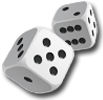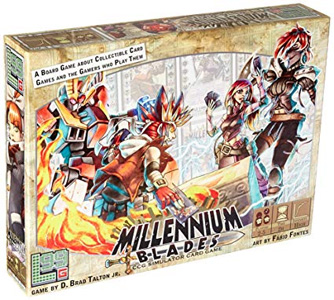



play board games
Board game reviews, strategy tips & session reports
Millennium Blades Review
 Stats:
Stats:
No. of players: 2-5
Amount of time to play: 80-120 min
Age requirements: 12+
Set-up time: 5 min
Millennium Blades is a CCG simulation board game. You score VPs by building collections and winning tournaments with decks you build in real-time in the game.
Millennium Blades Rules Description:
Millennium Blades encapsulates much of the CCG experience. You collect, buy, and sell cards to make decks you bring to tournaments. You begin play with a starter deck and $30.
The game is played over three rounds that are divided into two phases, the Deckbuilding Phase and Tournament Phase. At the start of the Deckbuilding Phase you gain six random cards, reveal a metagame card, and start a timer with seven minutes. During this seven minutes, you can buy face-down cards, sell or buy cards in the aftermarket, trade cards with other players, or make a collection cards. There are no turns. It is followed by another seven minute stretch which begins with getting six more random cards and flipping the second metagame card. Once that ends, you have a final six minutes during which you cannot sell cards to the aftermarket.
The end result of this hectic twenty minutes is to have a deck ready for the tournament. Before it begins you gain VP for the collection you made in the Deckbuilding Phase. You can bring a deck box, two accessories and up to eight singles. The Tournament Phase has turns and on your turn you must play a card and may play an action. Cards are played in the left most available slot (of six) on your tableau. If you take an action with a card it is flipped face-down. Playing cards can score you Ranking Points immediately or after all players have placed their six cards. Even flipping cards can get you Ranking Points. You also gain fifteen Ranking Points for each meta card that matches a face up card in your tableau.
Some cards or action let you clash. In a clash, players take the value of their right-most face up card and add the value of a card drawn from the top of the store deck. The player with the higher total value wins the clash. Winning or losing a clash has different effects based on the card used to start a clash.
Whoever has the most Ranking Points at the end of the tournament wins that tournament. You score VPs based on which position you ended up in in the tournament. This cycle repeats two more times and the player with the most VPs wins the game.
Quick Review of Millennium Blades:
Millennium Blades is a complex, intense, and fun, board game. It does a very good job simulating many of the aspects of a CCG. From buying random cards to collecting sets and being aware of the meta, it is all there.
The components for this game are very well done. It just looks good on the table. Some of the card art is better than some others, but none of it is bad. The rules are straightforward and a quick read. You might want to read them, find a video tutorial to watch and then read the rules again. The wads of money are fun but can be annoying to handle and stack.
I really like the timed Deckbuilding Phase. Having limited time keeps things moving and amps up the tension. You might not always need the full time. But more often you’ll feel like you do as there is a lot to accomplish. You can’t ignore your collection and refining your deck is a must.
The Tournament Phase is less exciting but there are lots of VPs to be gained if you can win the tournament. It is fun finding cards that create a VP scoring machine.
This game is not for everyone though. It has a decent learning curve so newer gamers (or non-gamers) will probably think it is too complex. And though the time goes quick, it is a long game. Some people have noted the tear down can take a while too. I have simply kept the suggested starting setup together. It has a lot of replayability, but separating all the cards after every play would take some time.
If you enjoy or have played CCGs, you should enjoy Millennium Blades. It does a great job bringing together its theme and mechanics. If you are not a CCG fan, but don’t mind longer games with some complexity, this one is worth trying.
Score and synopsis: (Click here for an explanation of these review categories.)
Strategy 4 out of 6
Luck 5 out of 6
Player Interaction 4 out of 6
Replay Value 6 out of 6
Complexity 5 out of 6
Fun 5 out of 6
Overall 5 out of 6

Leave a Reply